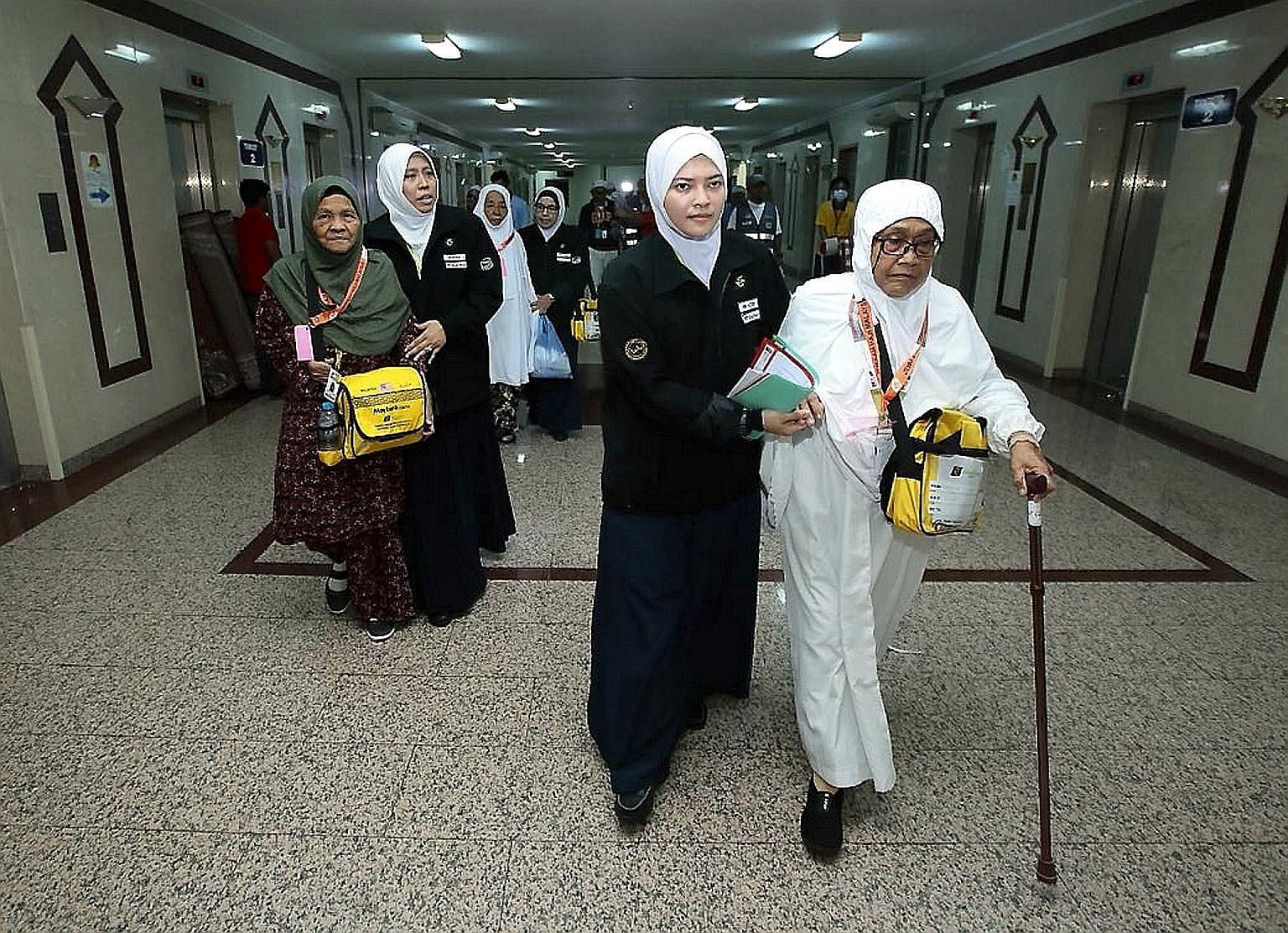A RM9 billion (S$3 billion) shortfall in Malaysia's Muslim pilgrimage savings fund Tabung Haji (TH) revealed by the Pakatan Harapan (PH) government last week is set to be the hottest political potato pitting the Mahathir Mohamad administration against the two main opposition parties, Umno and Parti Islam SeMalaysia.
The alleged mismanagement will strike close to home as it concerns the hard-earned savings of nine million Malay Muslims, unlike distant scandals like 1MDB or the various failed government projects uncovered since Umno's six decades of hegemony was broken in the May 9 election.
The government has announced what is effectively a bailout plan for the haj fund that manages RM73 billion in savings. The government is taking over assets TH bought for nearly RM20 billion that are now worth RM9 billion less.
The government's announcement on TH by de facto Islamic Affairs Minister Mujahid Yusof Rawa confirmed a Dec 2 report in The Sunday Times that the haj fund would be restructured as its liabilities outstripped assets by RM4 billion on paper last year, and that the actual shortfall was higher at RM9 billion as accounts were falsified.
Mr Mujahid said TH was "illegally" paying dividends between 2014 and last year, as its liabilities were larger than its assets.
The government analysis of TH was announced after a review of its accounts by Pricewaterhouse-Coopers (PwC), with the report presented in Parliament last Monday.

Tackling the TH problem head on is seen as a big risk taken by Prime Minister Mahathir Mohamad due to its hallowed status among Malay Muslims in Malaysia.
TH was set up 55 years ago to help Muslims save up for the haj, a pilgrimage to Mecca they are obligated to perform at least once.
Over the decades, TH gained wide respect in the Islamic world for its management of the savings and efficient organisation of the haj, performed by 30,000 Malaysians every year.
The TH scandal has put Umno and PAS on the the defensive as they have just enjoyed a successful pro-Malay Muslim rally that saw over 50,000 gathered in the heart of Kuala Lumpur.
But analysts say exposing the TH troubles only provides the seven-month PH government temporary relief from growing anxiety among Malays that their special rights and privileges are being sidelined. They are being prodded by Umno and PAS - both of which have long positioned themselves as defenders of the majority race.
"It can be an effective issue for PH on the Malay ground but it bears the risk of a potential collapse of trust of the institution. You can already see Umno and PAS questioning PH's motive and objectivity," Mr Amir Fareed, strategy director of political risk consultancy KRA, told The Sunday Times.
Former premier Najib Razak and his close confidante, Datuk Seri Azeez Rahim - who was TH chairman until he resigned following the general election - have made swift rebuttals, claiming an alternate study of TH accounts by Ernst & Young (EY) showed that the fund has more assets than liabilities, contradicting the PwC report tabled by the government.
PAS leader Khairuddin Aman Razali joined them in casting doubt over the credibility of the PwC review, curiously calling for an "external and independent" audit.
But EY has denied it had audited TH or that its reports can be used to justify dividends paid out, saying it was merely providing input on the impact of marking investments to current values on TH's balance sheets.
Several Malay opposition figures want a Royal Commission of Inquiry to be set up, a move seen as an attempt to take the matter out of the hands of PH politicians.
Among them are PAS president Abdul Hadi Awang, who "advises the government not to politicise the issue to the point that it damages Tabung Haji's image. Don't let a drop of indigo spoil a whole pot of milk".
In the meantime, the new leadership of TH has lodged police reports against Umno-appointed predecessors, including former chairman Azeez.
These include allegations of abuse of millions of dollars for political financing and hiding information on a 2012 sale of an Indonesian plantation for US$910 million (S$1.25 billion), which TH has yet to receive.
A former chief executive of subsidiary TH Heavy Engineering was, meanwhile, charged with graft last Wednesday.
In TH's Facebook account, where it announced the financial restructuring, hundreds of comments were posted describing the anger and anguish of depositors.
Some blamed the previous Umno-led government, while others accused "Chinese-controlled" PH of wanting to destroy the haj fund.
Umno, and by extension PAS, will have more curveballs on Malay issues to deal with in the future.
The PH government is preparing a White Paper on another beloved Malay Muslim institution, the federal land development agency Felda that resettled nearly 113,000 poor Malay families in plantation estates.
The government has postponed the tabling of the White Paper in Parliament to the next sitting early next year.
The Sunday Times has learnt that the government is set to reveal yet more mismanagement at Felda, as well as graft under the previous government.
Rajaratnam School of International Studies senior fellow Johan Saravanamuttu believes that despite the pushback from Malay nationalists against PH, the government stands on solid political ground as "Umno's ultimate collapse is a foregone conclusion" under the weight of these scandals.
And PAS, he said, may "mop up Umno residuals eventually but it remains a regional party".
ISEAS - Yusof Ishak Institute fellow Norshahril Saat told The Sunday Times that to gain wider trust, "PH needs to ensure governance is clean and efficient, while maintaining Malaysia's identity as multiracial with strong Malay Muslim character".
"The issue could be used as political ammunition by PH, particularly on what 'defending' Malay rights mean. But reversing race and religious politics remain a tall order as there is significant support for Umno and PAS' call for the protection of Malay and Muslim rights."

